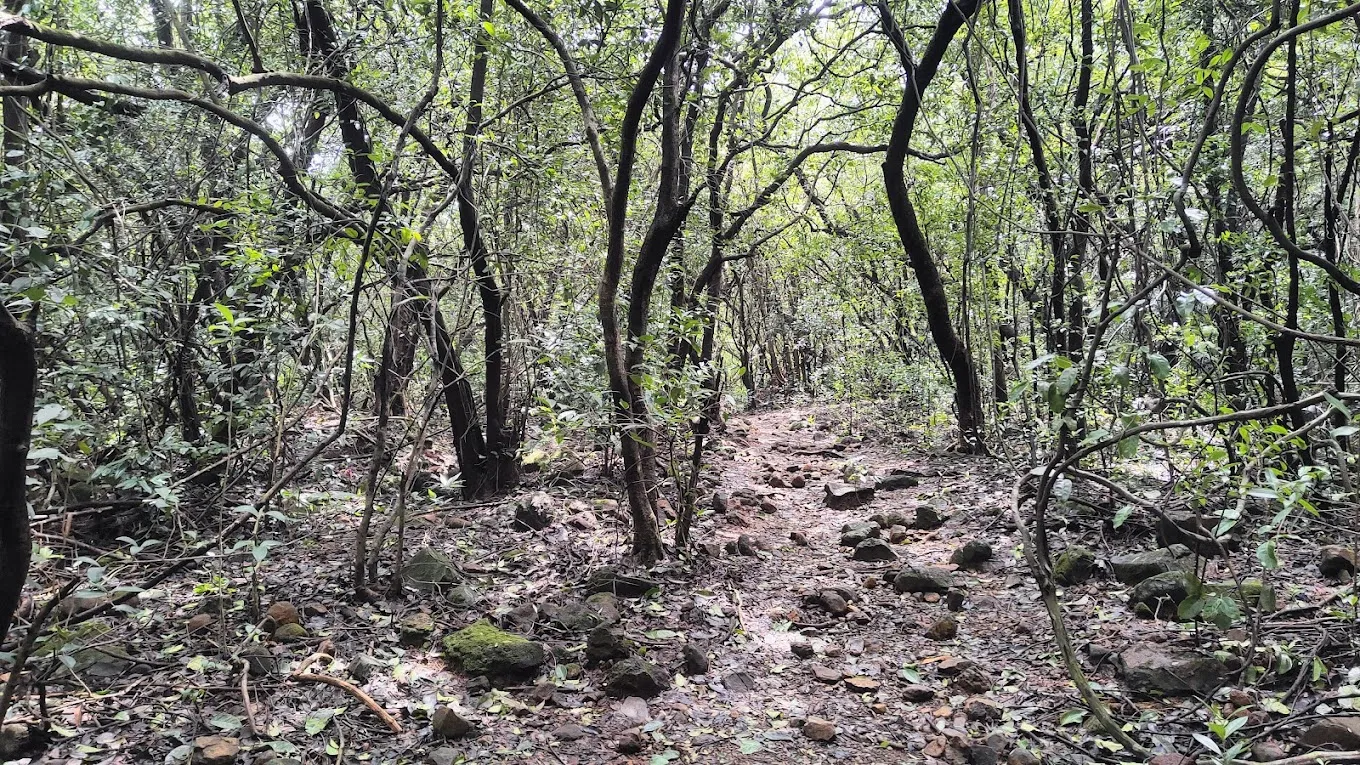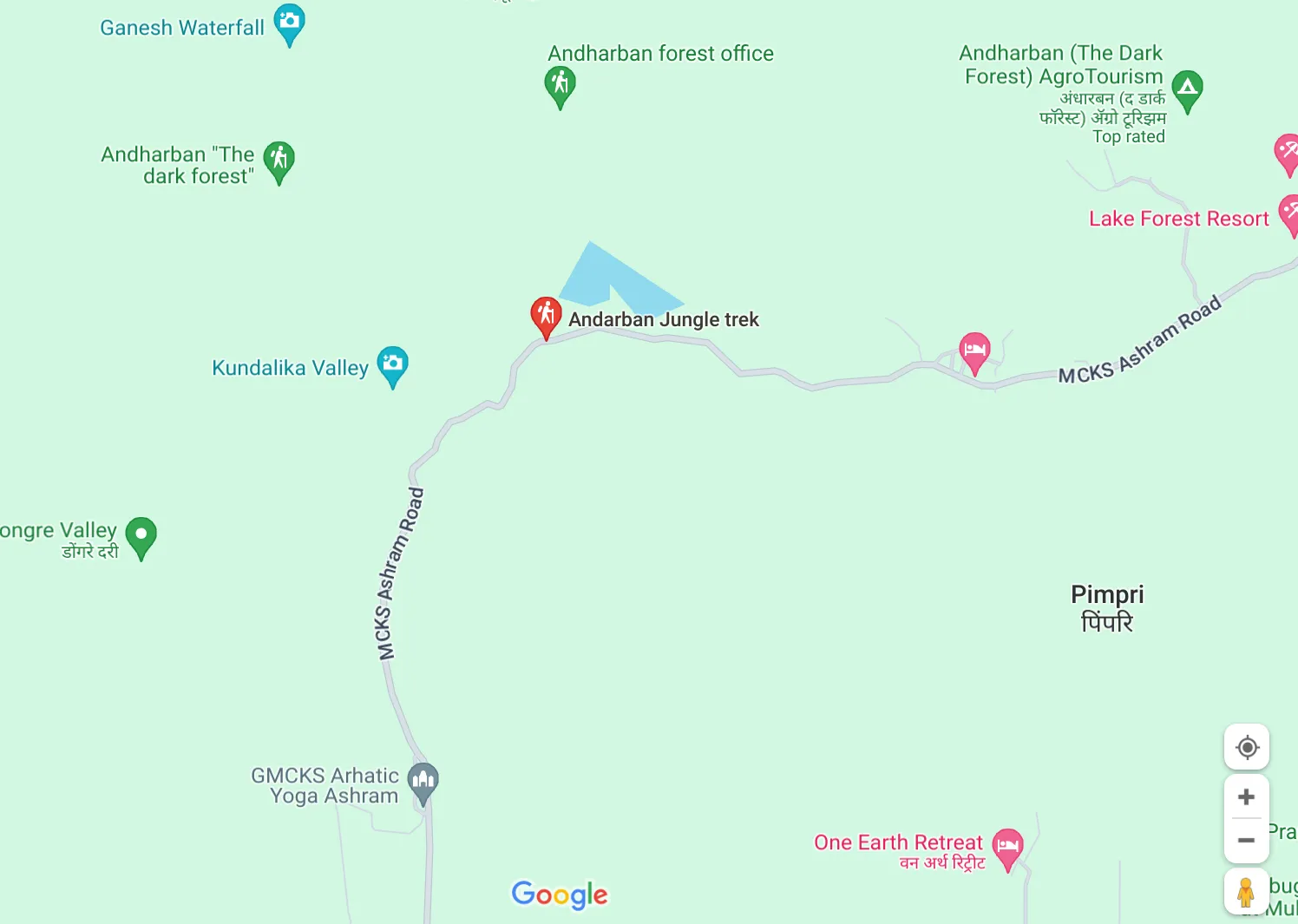August 11, 2024
Into the Wild: Exploring the Andharban Trek
Overview
The Andharban Trek is like stepping into a storybook adventure through the thick forests of the Sahyadri range.
In this post, we'll walk you through everything you need to know to plan your next trek and make the most of this unforgettable journey.
Andharban Trek Summary
Here's a quick overview of the Andharban Trek to assist you in your planning:
| Attribute | Details |
|---|---|
| Height/Altitude | Approximately 2,100 meters |
| Base Village | Pimpri Village |
| Best Time to Visit | June to September |
| Difficulty Level | Moderate |
| Trek Distance | Approximately 13 km (one way) |
| Distance from Mumbai | Approximately 160 km |
| Distance from Pune | Approximately 70 km |
| Trek Time | 5-6 hours |
| Trek Cost | Varies (around ₹500 -₹2000 per person) |
| Fitness Level | Medium |
| Trek Compatibility | Solo, Groups |
| Pre-trek Preparation | Daily Walking, Running, Cardio |
| Accommodation | Basic accommodations available at Pimpri Village |
Read more:
Things to Carry
To ensure a safe and enjoyable trek to Andharban Trek, here are some essential items to pack:
- Comfortable trekking shoes
- Water bottle/hydration pack
- Snacks (energy bars, nuts, fruits)
- Lunch
- First-aid kit
- Sunscreen, sunglasses, hat
- Raincoat (if you trek in the rainy season)
- Extra clothes, socks
- Headlamp, torch
- Personal medication
Food:
- Carry snacks and water
- Lunch available at the base village
- No food available during the trek
Animal Presence:
- Yes, wild animals like snakes, monkeys, and birds
- Be cautious and make noise while trekking
- Keep a safe distance from animals
How to Reach
From Mumbai to Pimpri Village:
- By Road:
- Take the Mumbai-Pune Expressway
- Exit at the Lonavala-Khandala exit
- Continue on the NH48 towards Pune
- Take a right turn at the Pimpri Village signboard
- Follow the village road to reach the base village
- By Bus:
- Take a bus from Mumbai's Shivaji Nagar Bus Stand to Lonavala
- Get down at the Lonavala Bus Stand
- Take a local taxi or rickshaw to Pimpri Village (20 km, 30 minutes)
- By Train:
- Take a train from Mumbai's CST or Dadar station to Lonavala
- Get down at the Lonavala Railway Station
- Take a local taxi or rickshaw to Pimpri Village (20 km, 30 minutes)
From Pune to Pimpri Village:
- By Road:
- Take the Pune-Lonavala Highway
- Continue on the NH48 towards Lonavala
- Take a right turn at the Pimpri Village signboard
- Follow the village road to reach the base village
- By Bus:
- Take a bus from Pune's Shivaji Nagar Bus Stand to Lonavala
- Get down at the Lonavala Bus Stand
- Take a local taxi or rickshaw to Pimpri Village (10 km, 20 minutes)
- By Train:
- Take a train from Pune's Railway Station to Lonavala
- Get down at the Lonavala Railway Station
- Take a local taxi or rickshaw to Pimpri Village (10 km, 20 minutes)
From Nashik to Pimpri Village:
- By Road:
- Take the Nashik-Pune Highway
- Continue on the NH50 towards Pune
- Take a right turn at the Pimpri Village signboard
- Follow the village road to reach the base village
- By Bus:
- Take a bus from Nashik's Central Bus Stand to Lonavala
- Get down at the Lonavala Bus Stand
- Take a local taxi or rickshaw to Pimpri Village (20 km, 30 minutes)
- By Train:
- Take a train from Nashik's Railway Station to Lonavala
- Get down at the Lonavala Railway Station
- Take a local taxi or rickshaw to Pimpri Village (20 km, 30 minutes)
Itinerary
You can change the timing according to your comfort and the time you want to spend.
- 6:00 am - Depart from Pune/Mumbai
- 9:00 am - Arrive at Pimpri Village
- 9:30 am - Start trek
- 1:00 pm - Lunch break
- 3:00 pm - Reach summit
- 5:00 pm - Descend
- 8:00 pm - Arrive at Pimpri Village
Key Insights from My Research and Reviews
1. Best Time to Visit:
- Monsoon (June to September): This is the ideal period to experience the lush greenery, continuous rainfall, and numerous waterfalls that characterize the trek. The trek is most beautiful during this time, with the dense forest and cloud cover creating a mystical ambiance.
2. Trek Highlights:
- Scenic Beauty: The trek offers stunning views of the Kundalika Valley, Bhira Dam, and the mountain ranges of Tamhini Ghat. The dense forest and waterfalls provide a picturesque setting, making it a paradise for nature lovers.
- Unique Experiences: Continuous rainfall and the experience of walking through a dark forest are key highlights. The trek is also famous for its firefly sightings in May and June, making it a unique experience before the monsoon.
3. Trek Difficulty and Duration:
- Full Trek: The total trek is around 16 km and takes approximately 7 hours, including stops. The first half of the trek is easier, with two waterfalls along the way, but the second half involves a steep descent through rocky terrain, which can be challenging and less rewarding.
- Half Trek Recommendation: Many recommend doing only the first half (around 8 km) and then returning, as the second half is less scenic and involves a continuous rocky descent. The half trek is more manageable and enjoyable, taking around 4-5 hours.
4. Safety Considerations:
- Slippery Terrain: Due to continuous rain, the trek can be slippery, especially in certain spots. It's important to wear good trekking shoes to prevent slips and falls.
- Waterproofing: Given the heavy rain, it's essential to pack valuables, especially phones, in waterproof bags to avoid water damage. Rain gear is also recommended, though it may not fully protect against the intense rainfall.
- Guides and Navigation: It’s advisable to hire a guide for navigation, especially for first-time trekkers, as the trail can be challenging to follow.
5. Amenities and Preparation:
- No Shops on the Trek: There are no shops or facilities along the trek, so carrying enough water (2-3 liters) and snacks is essential.
- Entry Fees: Expect to pay multiple fees—Rs. 50 for private area entry, Rs. 140 for forest entry, and additional parking fees. Carry cash as there is no network coverage.
- Accommodation: Homestays are available in nearby Pimpri village, providing an affordable and comfortable option for those wanting to stay overnight.
6. Transportation:
- Private Vehicle Recommended: Traveling by your own vehicle is preferred as it allows for flexibility in stopping at scenic spots along the way. However, paid drivers can be hired to move your vehicle to the end point if you plan to complete the full trek.
7. Environmental and Cultural Insights:
- Respect for Nature: The trek passes through pristine natural areas, and it’s important to carry back all waste to preserve the environment.
- Local Culture: Interacting with locals, such as staying at Abir Hotel, where the owners treat guests like family, adds a cultural dimension to the trek.
Google Map of the Location
Conclusion
In conclusion, the Andharban Trek is an unforgettable adventure that immerses you in breathtaking landscapes, thrilling challenges, and a deep connection with nature.
If you have any doubts, need any guidance, or have any questions, feel free to ask me in the comment section below.
FAQs:
1. What is the entry fee for Andharban trek?
Ans: The entry fee for Andharban trek is ₹50 per person.
2. Which is better, Andharban or Aadrai Jungle Trek?
Ans: Both treks have unique features. Andharban Trek offers a scenic waterfall, while Aadrai Jungle Trek is a more rugged and challenging trek.
3. Can I do Andharban trek on my own?
Ans: Yes, but it's recommended to go with a group or an experienced guide due to the trek's medium difficulty level.
4. What is the weather like in Andharban trek?
Ans: The weather is pleasant during the monsoon season (June to September), with occasional rain showers.


